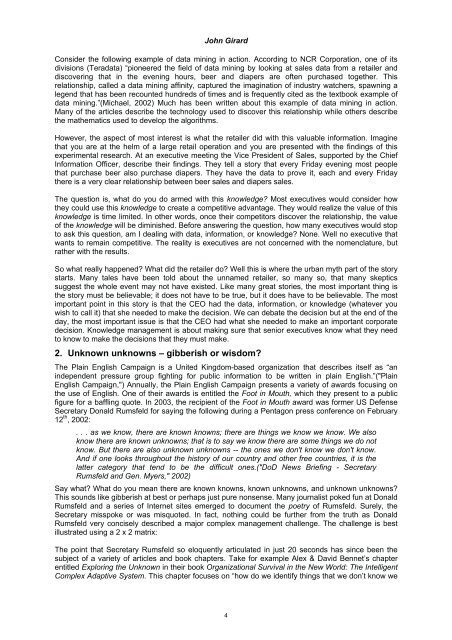Proceedings of the 3rd European Conference on Intellectual Capital
Proceedings of the 3rd European Conference on Intellectual Capital
Proceedings of the 3rd European Conference on Intellectual Capital
Create successful ePaper yourself
Turn your PDF publications into a flip-book with our unique Google optimized e-Paper software.
John Girard<br />
C<strong>on</strong>sider <str<strong>on</strong>g>the</str<strong>on</strong>g> following example <str<strong>on</strong>g>of</str<strong>on</strong>g> data mining in acti<strong>on</strong>. According to NCR Corporati<strong>on</strong>, <strong>on</strong>e <str<strong>on</strong>g>of</str<strong>on</strong>g> its<br />
divisi<strong>on</strong>s (Teradata) “pi<strong>on</strong>eered <str<strong>on</strong>g>the</str<strong>on</strong>g> field <str<strong>on</strong>g>of</str<strong>on</strong>g> data mining by looking at sales data from a retailer and<br />
discovering that in <str<strong>on</strong>g>the</str<strong>on</strong>g> evening hours, beer and diapers are <str<strong>on</strong>g>of</str<strong>on</strong>g>ten purchased toge<str<strong>on</strong>g>the</str<strong>on</strong>g>r. This<br />
relati<strong>on</strong>ship, called a data mining affinity, captured <str<strong>on</strong>g>the</str<strong>on</strong>g> imaginati<strong>on</strong> <str<strong>on</strong>g>of</str<strong>on</strong>g> industry watchers, spawning a<br />
legend that has been recounted hundreds <str<strong>on</strong>g>of</str<strong>on</strong>g> times and is frequently cited as <str<strong>on</strong>g>the</str<strong>on</strong>g> textbook example <str<strong>on</strong>g>of</str<strong>on</strong>g><br />
data mining.”(Michael, 2002) Much has been written about this example <str<strong>on</strong>g>of</str<strong>on</strong>g> data mining in acti<strong>on</strong>.<br />
Many <str<strong>on</strong>g>of</str<strong>on</strong>g> <str<strong>on</strong>g>the</str<strong>on</strong>g> articles describe <str<strong>on</strong>g>the</str<strong>on</strong>g> technology used to discover this relati<strong>on</strong>ship while o<str<strong>on</strong>g>the</str<strong>on</strong>g>rs describe<br />
<str<strong>on</strong>g>the</str<strong>on</strong>g> ma<str<strong>on</strong>g>the</str<strong>on</strong>g>matics used to develop <str<strong>on</strong>g>the</str<strong>on</strong>g> algorithms.<br />
However, <str<strong>on</strong>g>the</str<strong>on</strong>g> aspect <str<strong>on</strong>g>of</str<strong>on</strong>g> most interest is what <str<strong>on</strong>g>the</str<strong>on</strong>g> retailer did with this valuable informati<strong>on</strong>. Imagine<br />
that you are at <str<strong>on</strong>g>the</str<strong>on</strong>g> helm <str<strong>on</strong>g>of</str<strong>on</strong>g> a large retail operati<strong>on</strong> and you are presented with <str<strong>on</strong>g>the</str<strong>on</strong>g> findings <str<strong>on</strong>g>of</str<strong>on</strong>g> this<br />
experimental research. At an executive meeting <str<strong>on</strong>g>the</str<strong>on</strong>g> Vice President <str<strong>on</strong>g>of</str<strong>on</strong>g> Sales, supported by <str<strong>on</strong>g>the</str<strong>on</strong>g> Chief<br />
Informati<strong>on</strong> Officer, describe <str<strong>on</strong>g>the</str<strong>on</strong>g>ir findings. They tell a story that every Friday evening most people<br />
that purchase beer also purchase diapers. They have <str<strong>on</strong>g>the</str<strong>on</strong>g> data to prove it, each and every Friday<br />
<str<strong>on</strong>g>the</str<strong>on</strong>g>re is a very clear relati<strong>on</strong>ship between beer sales and diapers sales.<br />
The questi<strong>on</strong> is, what do you do armed with this knowledge? Most executives would c<strong>on</strong>sider how<br />
<str<strong>on</strong>g>the</str<strong>on</strong>g>y could use this knowledge to create a competitive advantage. They would realize <str<strong>on</strong>g>the</str<strong>on</strong>g> value <str<strong>on</strong>g>of</str<strong>on</strong>g> this<br />
knowledge is time limited. In o<str<strong>on</strong>g>the</str<strong>on</strong>g>r words, <strong>on</strong>ce <str<strong>on</strong>g>the</str<strong>on</strong>g>ir competitors discover <str<strong>on</strong>g>the</str<strong>on</strong>g> relati<strong>on</strong>ship, <str<strong>on</strong>g>the</str<strong>on</strong>g> value<br />
<str<strong>on</strong>g>of</str<strong>on</strong>g> <str<strong>on</strong>g>the</str<strong>on</strong>g> knowledge will be diminished. Before answering <str<strong>on</strong>g>the</str<strong>on</strong>g> questi<strong>on</strong>, how many executives would stop<br />
to ask this questi<strong>on</strong>, am I dealing with data, informati<strong>on</strong>, or knowledge? N<strong>on</strong>e. Well no executive that<br />
wants to remain competitive. The reality is executives are not c<strong>on</strong>cerned with <str<strong>on</strong>g>the</str<strong>on</strong>g> nomenclature, but<br />
ra<str<strong>on</strong>g>the</str<strong>on</strong>g>r with <str<strong>on</strong>g>the</str<strong>on</strong>g> results.<br />
So what really happened? What did <str<strong>on</strong>g>the</str<strong>on</strong>g> retailer do? Well this is where <str<strong>on</strong>g>the</str<strong>on</strong>g> urban myth part <str<strong>on</strong>g>of</str<strong>on</strong>g> <str<strong>on</strong>g>the</str<strong>on</strong>g> story<br />
starts. Many tales have been told about <str<strong>on</strong>g>the</str<strong>on</strong>g> unnamed retailer, so many so, that many skeptics<br />
suggest <str<strong>on</strong>g>the</str<strong>on</strong>g> whole event may not have existed. Like many great stories, <str<strong>on</strong>g>the</str<strong>on</strong>g> most important thing is<br />
<str<strong>on</strong>g>the</str<strong>on</strong>g> story must be believable; it does not have to be true, but it does have to be believable. The most<br />
important point in this story is that <str<strong>on</strong>g>the</str<strong>on</strong>g> CEO had <str<strong>on</strong>g>the</str<strong>on</strong>g> data, informati<strong>on</strong>, or knowledge (whatever you<br />
wish to call it) that she needed to make <str<strong>on</strong>g>the</str<strong>on</strong>g> decisi<strong>on</strong>. We can debate <str<strong>on</strong>g>the</str<strong>on</strong>g> decisi<strong>on</strong> but at <str<strong>on</strong>g>the</str<strong>on</strong>g> end <str<strong>on</strong>g>of</str<strong>on</strong>g> <str<strong>on</strong>g>the</str<strong>on</strong>g><br />
day, <str<strong>on</strong>g>the</str<strong>on</strong>g> most important issue is that <str<strong>on</strong>g>the</str<strong>on</strong>g> CEO had what she needed to make an important corporate<br />
decisi<strong>on</strong>. Knowledge management is about making sure that senior executives know what <str<strong>on</strong>g>the</str<strong>on</strong>g>y need<br />
to know to make <str<strong>on</strong>g>the</str<strong>on</strong>g> decisi<strong>on</strong>s that <str<strong>on</strong>g>the</str<strong>on</strong>g>y must make.<br />
2. Unknown unknowns – gibberish or wisdom?<br />
The Plain English Campaign is a United Kingdom-based organizati<strong>on</strong> that describes itself as “an<br />
independent pressure group fighting for public informati<strong>on</strong> to be written in plain English.”("Plain<br />
English Campaign,") Annually, <str<strong>on</strong>g>the</str<strong>on</strong>g> Plain English Campaign presents a variety <str<strong>on</strong>g>of</str<strong>on</strong>g> awards focusing <strong>on</strong><br />
<str<strong>on</strong>g>the</str<strong>on</strong>g> use <str<strong>on</strong>g>of</str<strong>on</strong>g> English. One <str<strong>on</strong>g>of</str<strong>on</strong>g> <str<strong>on</strong>g>the</str<strong>on</strong>g>ir awards is entitled <str<strong>on</strong>g>the</str<strong>on</strong>g> Foot in Mouth, which <str<strong>on</strong>g>the</str<strong>on</strong>g>y present to a public<br />
figure for a baffling quote. In 2003, <str<strong>on</strong>g>the</str<strong>on</strong>g> recipient <str<strong>on</strong>g>of</str<strong>on</strong>g> <str<strong>on</strong>g>the</str<strong>on</strong>g> Foot in Mouth award was former US Defense<br />
Secretary D<strong>on</strong>ald Rumsfeld for saying <str<strong>on</strong>g>the</str<strong>on</strong>g> following during a Pentag<strong>on</strong> press c<strong>on</strong>ference <strong>on</strong> February<br />
12 th , 2002:<br />
. . . as we know, <str<strong>on</strong>g>the</str<strong>on</strong>g>re are known knowns; <str<strong>on</strong>g>the</str<strong>on</strong>g>re are things we know we know. We also<br />
know <str<strong>on</strong>g>the</str<strong>on</strong>g>re are known unknowns; that is to say we know <str<strong>on</strong>g>the</str<strong>on</strong>g>re are some things we do not<br />
know. But <str<strong>on</strong>g>the</str<strong>on</strong>g>re are also unknown unknowns -- <str<strong>on</strong>g>the</str<strong>on</strong>g> <strong>on</strong>es we d<strong>on</strong>'t know we d<strong>on</strong>'t know.<br />
And if <strong>on</strong>e looks throughout <str<strong>on</strong>g>the</str<strong>on</strong>g> history <str<strong>on</strong>g>of</str<strong>on</strong>g> our country and o<str<strong>on</strong>g>the</str<strong>on</strong>g>r free countries, it is <str<strong>on</strong>g>the</str<strong>on</strong>g><br />
latter category that tend to be <str<strong>on</strong>g>the</str<strong>on</strong>g> difficult <strong>on</strong>es.("DoD News Briefing - Secretary<br />
Rumsfeld and Gen. Myers," 2002)<br />
Say what? What do you mean <str<strong>on</strong>g>the</str<strong>on</strong>g>re are known knowns, known unknowns, and unknown unknowns?<br />
This sounds like gibberish at best or perhaps just pure n<strong>on</strong>sense. Many journalist poked fun at D<strong>on</strong>ald<br />
Rumsfeld and a series <str<strong>on</strong>g>of</str<strong>on</strong>g> Internet sites emerged to document <str<strong>on</strong>g>the</str<strong>on</strong>g> poetry <str<strong>on</strong>g>of</str<strong>on</strong>g> Rumsfeld. Surely, <str<strong>on</strong>g>the</str<strong>on</strong>g><br />
Secretary misspoke or was misquoted. In fact, nothing could be fur<str<strong>on</strong>g>the</str<strong>on</strong>g>r from <str<strong>on</strong>g>the</str<strong>on</strong>g> truth as D<strong>on</strong>ald<br />
Rumsfeld very c<strong>on</strong>cisely described a major complex management challenge. The challenge is best<br />
illustrated using a 2 x 2 matrix:<br />
The point that Secretary Rumsfeld so eloquently articulated in just 20 sec<strong>on</strong>ds has since been <str<strong>on</strong>g>the</str<strong>on</strong>g><br />
subject <str<strong>on</strong>g>of</str<strong>on</strong>g> a variety <str<strong>on</strong>g>of</str<strong>on</strong>g> articles and book chapters. Take for example Alex & David Bennet’s chapter<br />
entitled Exploring <str<strong>on</strong>g>the</str<strong>on</strong>g> Unknown in <str<strong>on</strong>g>the</str<strong>on</strong>g>ir book Organizati<strong>on</strong>al Survival in <str<strong>on</strong>g>the</str<strong>on</strong>g> New World: The Intelligent<br />
Complex Adaptive System. This chapter focuses <strong>on</strong> “how do we identify things that we d<strong>on</strong>’t know we<br />
4
















